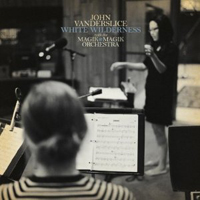 John Vanderslice with The Magik*Magik Orchestra: White Wilderness (Dead Oceans, 1/25/11)
John Vanderslice with The Magik*Magik Orchestra: White Wilderness (Dead Oceans, 1/25/11)
John Vanderslice with The Magik*Magik Orchestra: “Sea Salt”
[audio:https://alarm-magazine.com/wp-content/uploads/2011/02/seasalt.mp3|titles=John Vanderslice with the Magik*Magik Orchestra: “Sea Salt”]In San Francisco’s Mission District, the small but bustling Tiny Telephone is booked four months in advance. John Vanderslice is there everyday. Things are smooth. When he first opened the studio almost 15 years ago, this wasn’t the case. There were problems. Floods. Power outages. He would get calls while on tour. “At the beginning, it wasn’t a celebration,” he says. “It was just a grind.” But about three years ago, between albums, Vanderslice returned from the road and decided to take a break from touring. He was recently married, and he had the itch to explore not the world but the life that he had in San Francisco.
“When I came back, I was happier,” he says. “I was with my wife everyday. She’s a teacher, so I would [go to the studio] every day and just help bands. I would figure out stuff. And I started to make the studio a lot better. I got in this feedback loop where everything I was doing was helping the studio.” He admits that life could’ve taken him somewhere else — the studio might’ve not been a success. Even now, success is relative. Not long ago, Vanderslice got an E-mail from his bank. “Available balance: $0.22.” It was Christmas Eve. So though he’s not getting rich, measured other ways, things are better than ever. As he says of rough times in the past, “Everything kept pointing to all music, all studio, all the time.” They still are.
Vanderslice’s latest offering, White Wilderness, is a collaboration with Minna Choi’s Magik*Magik Orchestra (M*MO). Despite its size — nine tracks that fill only 31 minutes — the record has the power to engulf: like a controversy, the more one digs, the more complex it seems to get. What at first sounds like a thin, quirky rock album becomes instead a contained magnum opus. Portentously, White Wilderness was released exactly a week before a monstrous snow storm blanketed two-thirds of the United States, transforming the Midwest into a white wilderness of its own and bringing Chicago to a standstill; 20 inches whipped into eight-foot drifts proved too much, even for the city of broad shoulders.
Initial inklings for the project came two years ago, when Vanderslice played a show with M*MO at the Great American Music Hall. “Within the first 10 minutes of being in the center of 20 string players, I was like, ‘This has to be the next record.’” He and Choi had just begun a new partnership. Her collection of classical musicians would serve as a modular, in-house orchestra for Tiny Telephone, a solution to a problem that Choi had noticed for a while: it was always difficult to find classically trained musicians to record her arrangements, so why not create a group with that as its primary aim?
It was the perfect opportunity for a studio owner who owns every Gustav Mahler and W.A. Mozart symphony on vinyl. “The color — the use of oboe, French horn, and clarinet on Mahler symphonies — I just wanted to taste that,” he says of his passion for classical music. “I wanted, like, 0.1 percent of what I heard there to show up in my music.” Fueled also by artists like Sufjan Stevens and Joanna Newsom, who’ve skillfully woven orchestral music into other genres, Vanderslice wanted to get away from the typical, rock-music-with-string-overdubs sound: “I wanted to…just flip it around, where the orchestra is driving everything.” This meant that Vanderslice had to take himself out of the equation. After penning the original demos, he passed the material to Choi and didn’t hear the music again until three days before recording.
“It was as far as I could get from my usual process,” says Vanderslice, who normally does everything himself in his basement before even heading to the studio. “I told Minna, ‘Listen, I have a very high tolerance for dissonance, and I would love to include as many woodwinds as possible.’ End of sentence. I didn’t say another word to Minna about music. Ever. I never changed a note. I never made a suggestion about orchestration — after a 30-second conversation.”
In her bedroom, surrounded by piles of paper, Choi had a significant amount of work ahead of her, but with Vanderslice encouraging dissonance, one of her main hurdles had been leapt. “As an arranger, dissonance is the thing that I have to worry about most,” she says. “I compare it to a caterer being hired to cater a wedding — that’s kind of what I’m doing. I have to get inside their head and create something that’s to their taste. Dissonance is like spiciness; everybody has a different idea of what’s spicy, just like everyone has a different idea of what’s dissonant. It’s totally subjective, it’s totally personal, and there’s no right or wrong.”
“When I think of wilderness, I think of something unknown — there’s a little bit of anxiety, a little bit of unsettledness to me. But then the whole idea of a white wilderness is different. It’s very peaceful and very beautiful.”
For Choi, “White Wilderness” set the tone for the record. It was the first song that Vanderslice played for her, and as they listened, he said that he loved the dissonance in a recurring chord — “some version of an augmented fourth,” Choi recalls. So she paired that sound with the visceral imagery of the title. “When I think of wilderness, I think of something unknown — there’s a little bit of anxiety, a little bit of unsettledness to me,” she says. “But then the whole idea of a white wilderness is different. It’s very peaceful and very beautiful.” The tension there — itself a sort of thematic dissonance — became the fulcrum on which the rest of the album balanced.
* * *
Vanderslice and Choi click. On the album, much like in real life, they respect each other enough to not talk over the other, or step on toes, or do those things that could poison promising collaborations. And so, at times, the orchestra will disappear completely; other times it’s Vanderslice’s voice that vanishes. These absences enhance the record’s topography and keep it from becoming pallid. “After It Ends,” for example, might not withstand critique on its own. It’s not a single. If untethered, it would fade into the background and be lost. But within the record, it serves as respite between two of the record’s more overgrown tracks.
Without M*MO, the same might have happened to White Wilderness. Distilled down to micro-vignettes and a few instruments, the album might’ve faded into the background, barely registering, the equivalent of a nine-page book of poems sandwiched between John Ashberry and Charles Bukowski on the shelf of a crowded bookstore. This allusion is not unfitting. Actual Air, a collection of poems by David Berman (of Silver Jews fame) is such a book, agonizingly difficult to find, often buried among more formidable names. But there’s a hint of it in the way that Vanderslice constructs his vignettes, and when his songs are compared to Berman’s poetry, it becomes clear as to why. “Aw man, that guy’s my hero,” he says. “I’m a huge fan of his. David Berman has actually given me a lot of titles for a lot of my songs. He sends me lists of titles for me to use. I mean, that’s fucking incredible, right? It makes me feel like a really lucky person.”
Such informal, casual collaborations are not anomalies in Vanderslice’s world. Even the title, White Wilderness — the lyrical, musical, and conceptual anchor of the entire project — was suggested by John Darnielle of the Mountain Goats. And by the time that Vanderslice came to Choi with the name, he was already under its spell. “I’m making an album called White Wilderness,” he told her, “and it’s going to be all magic.” Whether he meant “all magic” or “all Magik” is unknown. Both would be accurate.
Darnielle also influenced Vanderslice’s lyrics, which are more personal here than in the past. “He’d really been encouraging me to write about my family, my father, and my childhood,” Vanderslice says. “I’d told him stories about my life and growing up, and he’s like, ‘Man, you have to write about some of this stuff.’ So I just started writing. ‘Convict Lake’ is as true as I can tell it. It’s basically an experience I had taking acid and getting altitude poisoning. And it was in some ways beyond surreal; and in other ways, it was the most horrific experience of my life.”
This gives the following “White Wilderness” — already a sort of dream sequence — an even heightened ethereality. As tough as autobiographical writing can be, Vanderslice is an adept storyteller, deft with the details of childhood. In “The Piano Lesson,” an anonymous teacher is in charge (“Place your thumb on the middle C”), and so M*MO’s musical roughhousing, led by a great bari-sax riff, becomes the rebelliousness of a kid stuck at a piano. “There are rules when you strike the drum,” the young Vanderslice is told. He doesn’t like that notion.
The songs are made stronger by Vanderslice’s plain, unadorned vocals, sometimes almost spoken, and by bits of well-fitting fantastical language, the vernacular of a young boy’s imagination. “20K” is the exaggerated deep-sea adventure of a Florida tour boat, the name a reference to Jules Verne’s 20,000 Leagues Under the Sea. “English Vines,” a gentle folk song replete with pedal steel, becomes a Poe-like tale: “By night, our neighbors’ invading vines / rooted into my dreams from underground / twined their nooses ’round our lives / branching out maniacally / they choked our sycamore / and grew thicker and thicker / and when I finally scaled their fence / to kill the source of this malevolence / were my neighbors watching me / from their house?”
Choi’s style here is modern, relying heavily on strings, brass, and simple, warm percussion to give muscle to the skeletal compositions of piano or acoustic guitar. Her orchestral arrangements feed off Vanderslice’s imagery as well as his brevity, respecting his selectivity even as they flesh out his stories. Some of the album’s most triumphant moments are in her graceful but compelling interludes: the pregnant phrasing between sung lines of “20K”; the seemingly endless rising and falling action at the end of “White Wilderness”; the end of “Sea Salt,” where a gorgeously layered orchestral volley becomes the air currents on which Vanderslice escapes, singing, “For the first time I could take to air / I was free now / I could go anywhere.”
In a way, this record is that same escape. No longer slave to savage condemnations of far-off political affairs, Vanderslice offers an honest, eager reflection of his past. So though it opens with a foreboding reference to the Gaza Strip, the album veers away from the political track and into new territory. “Sun shines on the Gaza Strip / smiles on the back alleys of Madrid / comes off the stone like a burning whip.”
* * *
As Choi arranged White Wilderness, Vanderslice planned his next project: a new studio, right next to Tiny Telephone. Vanderslice sits in his car, commenting on the progress. “They’re putting up mirrors and windows and doors today,” he says. “It’s incredible. It’s the most exhilarating feeling I’ve had in years. We’re sick of turning down work. We had Islands call us, we had Philadelphia Grand Jury — we always have these really great records that we can’t do.”
Bands love Tiny Telephone. Thao, Spoon, Ra Ra Riot, Mark Kozelek (Sun Kil Moon, Red House Painters), Death Cab for Cutie, Sleepytime Gorilla Museum — all these and more have spent time at Tiny Telephone, partly because of Vanderslice’s belief in the sanctity of a more traditional recording process, which favors analog tape, live takes, and a host of other once-again-popular techniques. (He was recently interviewed by Wired magazine for a story on the growing use of ribbon mics.) “We always encourage bands to be confident in what they’re doing,” he says. “We’re here documenting and recording what a band does, and there’s a lot of power in what four people do in a room together.”
Or consider the power of 19 people — 20 if you count Choi, whose siren-like vocals appear on “Overcoat.” Produced by seasoned engineer John Congleton (who’s worked with St. Vincent and the Walkmen, among others), White Wilderness’ strings, horns, winds, piano, and drums were all recorded live. M*MO came in, set up, and for two days straight, it made music. “We said three days in the press release because we honestly didn’t think anyone would really believe us,” Vanderslice notes.
Vanderslice is adamant that recording together, on analog tape and in full takes, is exactly what gives an album energy and life. Comparing the world of infinite overdubs to a mirror that magnifies things 100 times, he says that it’s ridiculous to obsess over such a distorted image. “That’s not what life is, and that’s not how people listen to music,” he says. “People listen to music in the totality and for the commitment to the performance. So yeah, we’ve done everything we can to fight this micro-management of performance.” One way is by giving bands free tape, which means that they’re on a linear format. “It encourages performances, it encourages whole takes, and it encourages not cut-and-pasting and correcting minor imperfections,” he says. “It endorses the music as it is. And it’s a strong endorsement because it sounds really good — it sounds better than digital.”
Another strong endorsement is the one that Vanderslice gives M*MO. He gives it all the credit for White Wilderness, and he encourages every band that comes through Tiny Telephone’s door to work with it. This isn’t surprising. After all, his approach to music isn’t really about the profession. It’s about life. The musical community that he’s a part of and has helped create is how he interacts with the world — professionally, yes, but also socially, civically, and politically. And the same goes for Choi, in a very tangible way. In March, Choi will finally abandon her bedroom office for a real office space between Tiny Telephone and the new studio, which opens its doors June 1. Vanderslice is no doubt happy to weave her more tightly into his daily collaborations, but it might be Choi who’s most thrilled with the move. Because of its solitary nature, arranging can be a lonely task, and Choi will be happy to inhabit a space where she’s not alone in her creative efforts.
“I’m really excited about how I’ll change, socially,” she says. “Because I spend so much time arranging, that meant before [that] I was spending a lot of time alone. Like on a Friday night, writing a string arrangement isn’t the most social activity, but now, I can come here and write here, and I’ll hear bands on both sides of me also doing something creative. We can, like, take breaks together, and go out for coffee, and it’s so much more fun-sounding.”
John Darnielle. David Berman. And now Minna Choi. Vanderslice seems to collect talented people. With a brilliant new partner in crime and an already solid community of collaborators, increasingly, Vanderslice has more reasons to stay put than to go on tour. “I love touring; I love that,” he says. “But man, this can compete toe-to-toe with being on tour any day. It’s that exciting and that fun.”






